September 7, 2017
 PROVIDENCE, R.I. [Brown University] – Girija Borker, a predoctoral trainee at the Population Studies and Training Center (PSTC), has been awarded the Data2X Big Data for Gender Challenge dissertation grant for her research on the impact of street harassment on the economic mobility of women in India. Borker is a graduate student in the Department of Economics at Brown.
PROVIDENCE, R.I. [Brown University] – Girija Borker, a predoctoral trainee at the Population Studies and Training Center (PSTC), has been awarded the Data2X Big Data for Gender Challenge dissertation grant for her research on the impact of street harassment on the economic mobility of women in India. Borker is a graduate student in the Department of Economics at Brown.
Borker’s award comes from Data2X, which is led by the United Nations Foundation with support from the William and Flora Hewlett Foundation and the Bill & Melinda Gates Foundation. The Big Data for Gender Challenge seeks projects using big data to fill gender data gaps.
“While entry of women into the workforce has contributed importantly to economic growth in most parts of the world, formal labor participation by women in India has risen surprisingly little over the last two decades,” said Professor of Economics Andrew Foster, Borker’s PSTC faculty mentor. “Girjia's work will help us better understand the role that harassment may play as a source of this disparity.”
Using data from mobile safety applications that report the perceived safety of an area, Borker aims to “shed light on some of the avoidance behaviors women undertake because of the fear of harassment and the costs associated with these behaviors.” Her research particularly addresses the effect of perceived street harassment on the education choices of women in Delhi, which is infamously known as the “rape capital” of India, and its ensuing impact on the economic mobility of women.
“Street harassment is a serious problem around the world,” said Borker. “Such lack of safety for women could be a major obstacle in achieving gender equality as it affects women’s mobility, access to education, and labor force participation, and has the potential to widen pre-existing gender gaps in lifetime earnings.”
Borker is examining the experiences of women enrolled at the University of Delhi, who commute to school every day. Most of them travel by public transportation, where sexual harassment is common. The study explores whether one of the coping mechanisms for female students is choosing colleges within the university system that are located along safer travel routes, even if they are lower ranked institutions.
“My project provides novel travel survey data, applies Google Maps in a creative way, uses the latest mobile app safety data to better understand gender specific constraints to daily urban travel, and assesses the long-term effects of these constraints,” Borker said. “Results from this study will provide the first quantitative estimate of the effect of harassment on women’s choice of college, a decision that affects women’s academic training, network of peers, access to labor opportunities, and lifetime earnings.”
Read more about Borker's research here.
- Jo Fisher